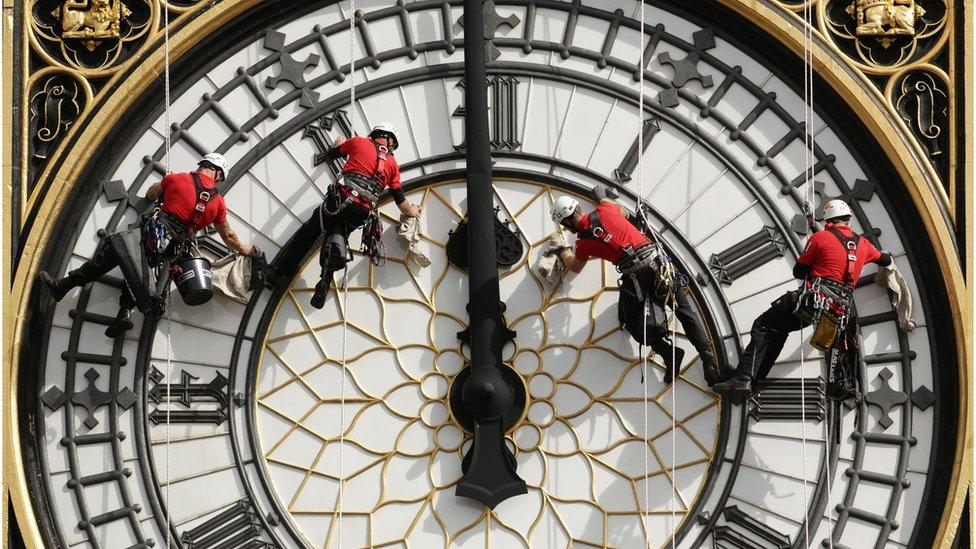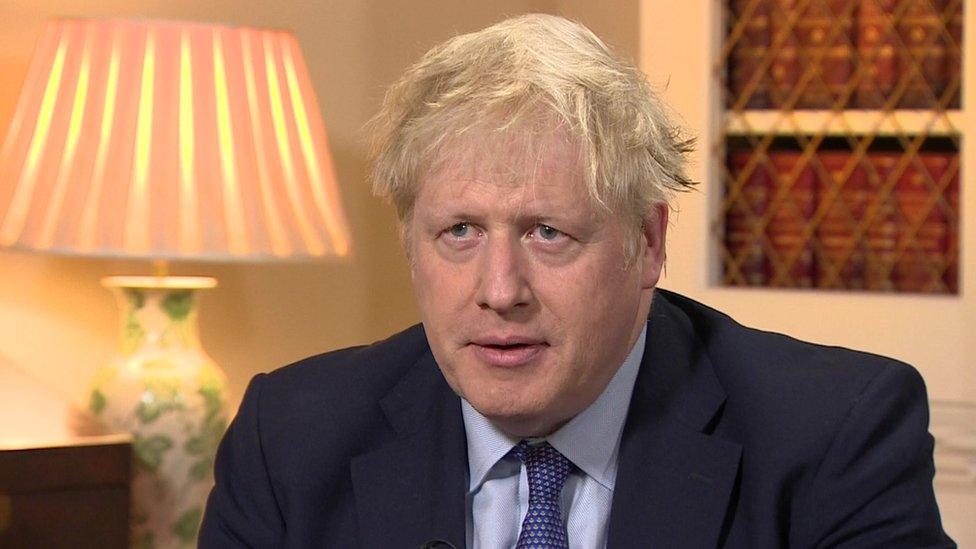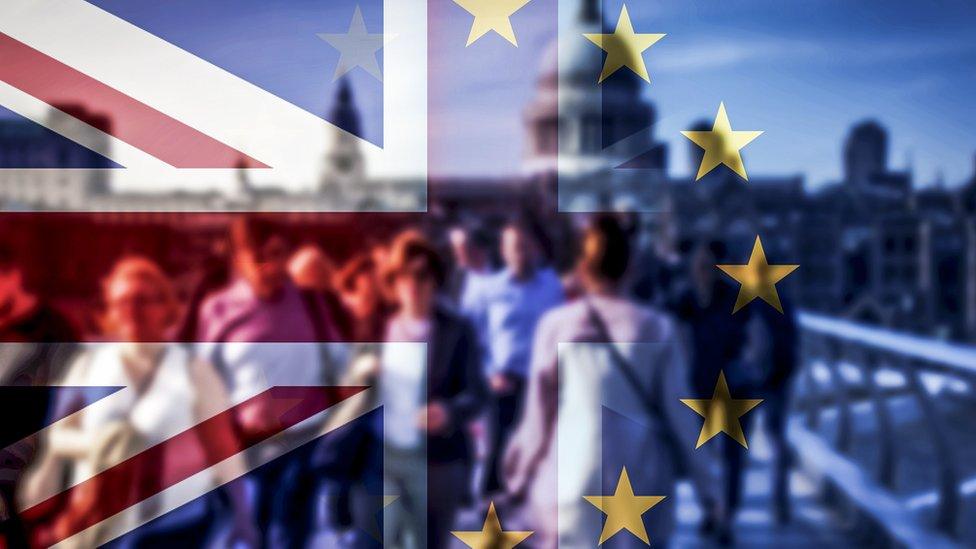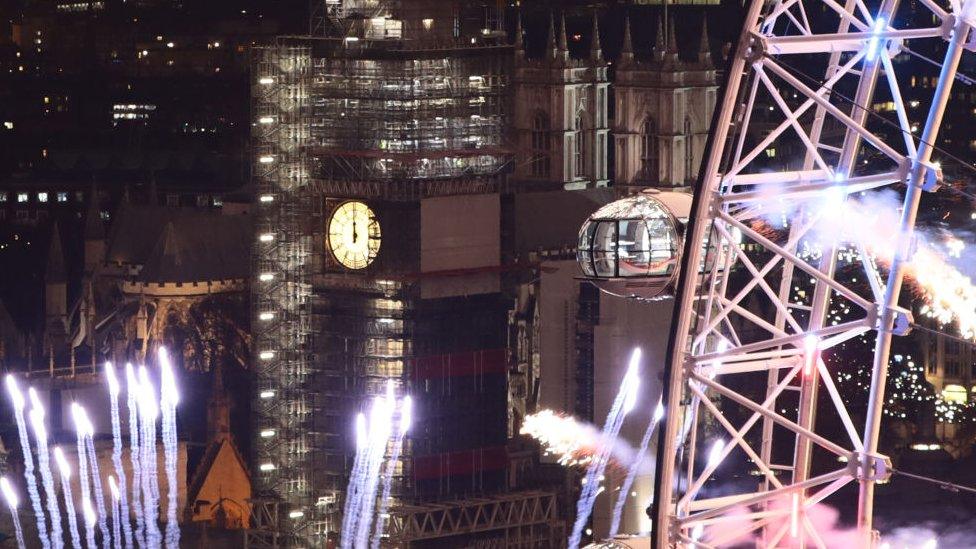£50k per bong: But for whom would the bell toll?
- Published

Should we celebrate Brexit, with peals of bells across a grateful nation?
For good or ill?
Somehow it seems we have contrived to fall out, not just about Brexit itself, but also how we should mark the event itself in just over two weeks' time.
Should we celebrate it, with peals of bells across a grateful nation?
Maybe it's just a technical formality, to be solemnly noted, but otherwise largely ignored.
Or perhaps it should be actively lamented as yet more evidence of Britain's declining fortunes.
I suspect Boris Johnson's suggestion that we should "bung a bob for a Big Ben bong" is his way of side-stepping the issue.

Is Boris Johnson side-stepping the issue?
Nigel Farage, buoyed after 'Leave means Leave' was granted approval for Brexit celebrations in Parliament Square, thinks the government is embarrassed by the whole idea.
But perhaps most startling of all is why it should cost £500,000 to just bring Big Ben out of its enforced purdah during the restoration project: £50,000 a bong. No wonder the PM talks about crowdfunding.
It turns out that the reason it's so expensive is that Big Ben's clapper has been removed to protect the ears of the workforce braving those dizzy heights.
Re-installing and then removing it again would be an elaborate and time-consuming enterprise in itself.
The idea of Big Ben observing its silent vigil towards zero-hour may seem curiously apt.

The passing of the Withdrawal Agreement Bill by 99 votes earlier this month appeared like an anti-climax
The general mood now that Brexit is actually happening is strangely muted compared with the anguish and turmoil leading up to those earlier "deadlines" that came and went, "last-ditch summits", "meaningful votes" that weren't, not to mention that "Super Saturday" that turned out to be anything but.
For good or ill, last month's general election has changed everything.
Remember the Conservatives claimed nine Midlands gains from Labour in north Staffordshire and the Black Country, plus one in Birmingham, propelling them towards their 80-seat majority, fuelled largely by Brexit sentiment in the region which delivered a bigger proportion of Leave votes than any other.
So the Withdrawal Agreement Bill was passed by 99 votes earlier this month involved a minimum of fuss.

Big Ben most recently chimed on New Year's Eve
Yes, there'll be protests, celebrations too, at 11pm on Friday 31 January, midnight in most of the rest of the EU, when the UK's departure formally takes effect.
But will we ever again witness anything with the scale or intensity of those earlier epics around Westminster and beyond?
Let me know if you're planning or aware of a party, or a wake, great or small, where you live.
For now I suspect we have passed "peak Brexit", at least until the end of the transitional or implementation period, enshrined in law for the end of this year.
Which changes the mood music, from hotly-contested debate to hard-headed preparation. Or so we hope...
Change of tune?

Hundreds of millions of pounds are to be invested in a new generation of JLR electric vehicles
What will it take for our part of the country to prove it's match-fit and ready for Brexit?
Our biggest manufacturer of British-badged cars, Midlands-based Jaguar Land Rover campaigned vigorously to remain in the EU and went on to shed 5,000 jobs during the two years that followed the referendum.
Brexit uncertainty wasn't their only problem.
Equally, if not more damaging were China's economic slowdown compounded by JLR's perceived sluggishness in response to collapsing markets for diesel vehicles.
With production lines in Slovakia and China, they're doing their best to hedge their bets.
But they are also pivoting towards a much more positive message about their prospects here at home, widely seen as a vote of confidence in post-Brexit Britain.
Hundreds of millions of pounds are to be invested in a new generation of electric vehicles to be built at their Castle Bromwich plant in Birmingham supported by a brand new battery factory also here in the West Midlands.
This may be no more than you would expect of such a large business, no doubt keeping their battalions of legal, accountancy and technical advisors gainfully employed calculating how best to exploit the various Brexit permutations.
But how are the myriad smaller local businesses coping, many in the extended supply chains of that same car-making industry?
A report to be published later this month by Birmingham City University's Department of Brexit Studies is expected to present a much more challenging picture.
Watch this space!
Ministers may stress all those exciting new trade deals they hope to negotiate around the world.
But one local business leader told me this week that these were secondary compared with the government's principal responsibility to negotiate a secure relationship with our biggest and closest trading partners in the EU.
The end of the transitional period could yet turn out to be the biggest test of all.
Will those bells be peeling joyfully on our next New Year's Eve? Or, if you will allow me to paraphrase, will we be up the tower without a clapper?
